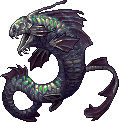Viewing Phawrm

Father: Unknown
Unknown Pedigree
Hardiness: 82
Appearance: 6
Emerged: 17:09 23.12.2020
Matured: 0:09 25.12.2020
Sightless due to their dark environments, Senvida Nagantos use a special sensory organ on their head to hunt. They are able to detect pheromones released by Cielarka Cimos, their sole source of food, and may stalk an insect for hours before leaping from the water. A quick slap of their agile tail stuns their prey long enough for the fish to drag it underwater. Although they lack eyes, Senvida Nagantos are attracted to sources of light and will congregate near waterside patches of the bioluminescent moss, Kaverno Musko, which Cielarka Cimos feed upon. The fish will also approach Monta Selos, likely due to the inability to distinguish between the two light sources with their rudimentary photosensory organs, although some researchers have speculated that it could be for protection. Monta Selos have no interest in the fish but do eat Ombra Vespertos; the latter prey upon Senvida Nagantos. Spawning occurs once a year, and a female may lay as many as two hundred fertilized eggs among the thin reeds of aquatic grass, Stona Strio, that grows in clumps where there is suitable nutrition. Juveniles feed upon Cielarka Cimo eggs and grubs until large enough to hunt adult insects.
The creatures that dwell in this rather desolate world still display some diversity in appearance, eating habits, and social behavior. Whether they have fur or feathers, skin or scales, their unique genetic makeup allows for a variety of colors and markings within each species. Despite limitations in food sources, herbivores, omnivores, and carnivores are all present in the food chain, and each species requires specialized care within a laboratory. Although the artificial setting of housing units and breeding pods precludes most opportunities to study true interspecific behavior, the interactions within and between species has been studied extensively in the wilderness by scientists daring enough to venture beyond the outpost’s walls.
